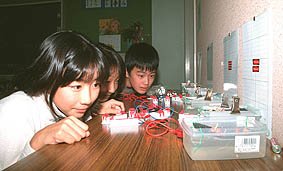|
MONTHLY NEWS December 1998 School Kids Help Out with Space Shuttle Experiments |
 Nearly 6,000 elementary and middle school students across Japan duplicated two scientific experiments that Japanese astronaut Chiaki Mukai conducted aboard the U.S. space shuttle Discovery on her voyage in late October and early November 1998.
Nearly 6,000 elementary and middle school students across Japan duplicated two scientific experiments that Japanese astronaut Chiaki Mukai conducted aboard the U.S. space shuttle Discovery on her voyage in late October and early November 1998.
Mukai conducted nearly 30 medical and scientific experiments in the gravity-free environment of outer space during her second space shuttle mission. Kids on Earth performed two of them in the same way: observing the germination of cucumbers and watching how corn and bean roots grow. After finishing the experiments, the students compiled their findings and sent them to the National Space Development Agency (NASDA) to be reviewed by Mukai and fellow NASDA staff. The student reports will allow scientists to compare the results on Earth with those obtained by Mukai aboard Discovery. NASDA officials said that the best reports by students would be given awards. At Hiyoshidai Elementary School in Tomisato, Chiba Prefecture, about 160 sixth graders took part. They sowed cucumber seeds on October 29 and 30 in three different ways; some were placed vertically in the soil, some horizontally, and others were inserted into a special water-absorbent board. The corn and bean seeds, meanwhile, were placed on wet paper towels. They kept the trays containing the planted seeds warm to get them to sprout, maintaining constant temperatures of around 22 to 24 degrees Celsius (72 to 75 degrees Fahereheit). On October 31 they moved the corn and bean sprouts to different containers so they could see how the roots would grow and began applying 6 volts of electricity for 30 to 40 minutes at half-hour intervals on the first day. From the second to the fourth day, a similar electric charge was applied just once a day. The kids then observed whether the charges had any effect on the way the roots grew. "Transplanting the sprouts was really difficult," said sixth grader Hiroko Oaku. Ryota Shirono added, "The experiments we did were very important, and it was really exciting to think that the results might one day be helpful in growing food in outer space when people start living in space stations." Besides the experimental results, NASDA also received 140,000 poems from the public after it asked people to complete a verse whose first half was written by Mukai during her recent mission:"Chu gaeri / nandomo dekiru / mujuryoku" ("Repeating somersaults over and over in zero gravity").
Photo: Students hard at work on the experiments. (Asahi Shogakusei Shimbun) |
.

|